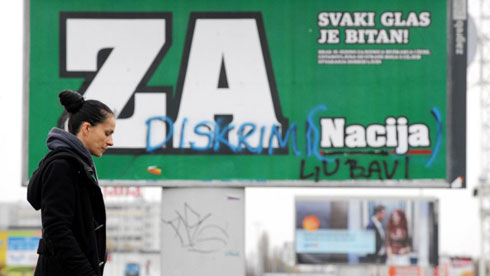Can a society that sees itself as pro-European, more importantly as "at Europe's forefront" and that is considering its accession to the European Union as a return to Europe's heart, living once again with its peers, take a cultural and political step backwards?
Alas, it can! We are now witnessing just such a phenomenon in Croatia. During the last commemoration of the fall of Vukovar [conquered by Serb forces on November 18, 1991], a “Committee for the Defence of Croatian Vukovar” [made up of veterans of the 1991-1995 war] challenged the government, a centre-left coalition led by the Social Democratic Party (SDP), preventing it from joining the march in memory of the victims of this city.
For a year now we have also been witnessing the birth of a movement gathered around the “On Behalf of the Family” initiative, which advocates the heterosexual family. Inspired by the Tea Party in the US, close to conservative circles, the Croatian initiative and its supporters are demanding that marriage be set out in the Constitution as the exclusive union of a man and a woman. With this in mind, they have collected 700,000 signatures for a referendum on marriage. Given the small number of openly gay people in Croatia, it is clear that gay marriage is merely a symbol of the distrust of the "other" and the "different", as well as a pretext for challenging the government and authority.
The referendum will be held on December 1, despite the objections of associations for the protection of human rights and rights of minorities, and despite the arguments of the Croatian People's Party [HNS, liberal, in the government coalition], which has pointed out that the referendum question endangers the fundamental rights of citizens. However, the Constitutional Court has come out in favour of the “On Behalf of the Family” initiative and given a green light to the question that will be asked in the referendum: “Do you support marriage being defined by the Constitution as the union for life between a man and a woman?”.
Traditional values
[[It is clear that Croatia is increasingly turning to traditional and moral values, such as the family, the religion and the nation]]. We merely have to remember the controversy over the introduction of sex education in school curricula, which revealed a huge gap between the conservative and liberal visions of the world; but we must also recall the differences in the perception of power, ideology and policy. The Academy of Culture and the Croatian Language, Matica Hrvatska, recently proposed fining all those who do not use the Croatian language properly. Although these are all legal initiatives coming from civil institutions and civil society, it’s an unmistakable sign of the times.
In an era of major changes caused by the financial and economic crisis, by unemployment, globalisation and the joining of the European Union, insecurity has increased, and so people are returning to modes of behaviour and values that give them a sense of security. This causes a problem when turning to neo-conservatism is accompanied by a desire to change the law – that is, the Constitution, which is supposed to be more durable than the crisis, the fears and other problems that, let us hope, are temporary.
Hidden Reconquista
[[But what happens when a civil association, namely the “On Behalf of the Family” initiative, manages to mobilise 700,000 people?]] And especially when the goal of the mobilisation is not the common good, but sexual discrimination, the exclusion of some citizens, and questioning the rights of man and the rights of minorities? What might be the possible consequences of a massive mobilisation that has no apparent political goal in a country where even the most minor decision has a political edge?
Is it a hidden Reconquista from the right, and from what right? It does not appear, after all, that the HDZ [Croatian Democratic Union, conservative and nationalist, the largest opposition party] is trying to manipulate the movement but seems rather to have had these objectives imposed on it. And all this is happening, of course, with the blessing (and financial support?) of the Church, which has rushed into the breach.
However, it is not the “supporters of the family” that will decide the outcome of the referendum, but the silent majority – those who think that all this does not concern them. Indeed, they do not grasp that this is a matter of principle, and not of gay marriage or the use of Cyrillic. Those who refuse to vote on this occasion, or on another, risk losing one day their right to vote at all.
Was this article useful? If so we are delighted!
It is freely available because we believe that the right to free and independent information is essential for democracy. But this right is not guaranteed forever, and independence comes at a cost. We need your support in order to continue publishing independent, multilingual news for all Europeans.
Discover our subscription offers and their exclusive benefits and become a member of our community now!












